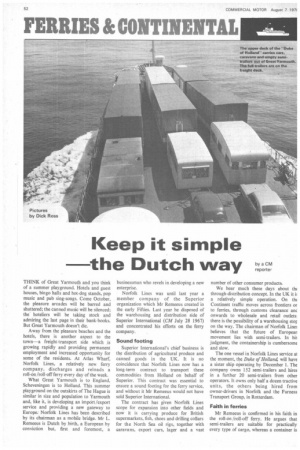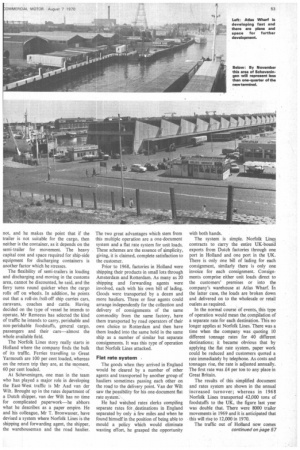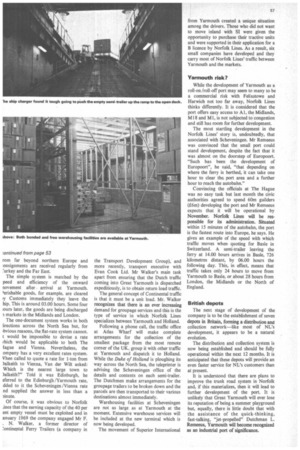Keep it simple the Dutch way
Page 54

Page 55

Page 59

If you've noticed an error in this article please click here to report it so we can fix it.
THINK of Great Yarmouth and you think of a summer playground. Hotels and guest houses, bingo halls and hot-dog stands, pop music and pub sing-songs. Come October, the pleasure arcades will be barred and shuttered; the canned music will be silenced; the hoteliers will be taking stock and admiring the last page in their bank-books. But Great Yarmouth doesn't die.
Away from the pleasure beaches and the hotels, there is another aspect to the town—a freight-transport side which is growing rapidly and providing permanent employment and increased opportunity for some of the residents. At Atlas Wharf, Norfolk Lines, a relatively new ferry company, discharges and reloads a roll-on /roll-off ferry every day of the week.
What Great Yarmouth is to England, Scheveningen is to Holland. This summer playground on the outskirts of The Hague is similar in size and population to Yarmouth arid, like it, is developing an impcirt /export service and providing a new gateway to Europe: Norfolk Lines has been described by its chairman as a mobile bridge. Mr L. Remeeus is Dutch by birth, a European by conviction but, first and foremost, a businessman who revels in developing a new enterprise.
Norfolk Lines was until last year a member company of the Superior organization which Mr Remeeus created in the early Fifties. Last year he disposed of the warehousing and distribution side of Superior International (CM July 28 1967) and concentrated his efforts on the ferry company.
Sound footing Superior International's chief business is the distribution of agricultural produce and canned goods in the UK. It is no coincidence that Norfolk Lines now has a long-term contract to transport these commodities from Holland on behalf of Superior. This contract was essential to ensure a sound footing for the ferry service, and without it Mr Remeeus would not have sold Superior International.
The contract has given Norfolk Lines scope for expansion into other fields and now it is carrying produce for British supermarkets, fish, shoes and drilling collars for the North Sea oil rigs, together with caravans, export cars, lager and a vast number of other consumer products.
We hear much these days about tit( through-distribution concept. In the UK it ir a relatively simple operation. On tilt Continent traffic moves across frontiers or to ferries, through customs clearance anc onwards to wholesale and retail outlets: there is the possibility of a warehousing stoc on the way. The chairman of Norfolk Lines believes that the future of European movement lies with semi-trailers. In his judgment, the containership is cumbersome and slow.
The one vessel in Norfolk Lines service at the moment, the Duke of Hollant will have a sister ship operating by December 1. The company owns 152 semi-trailers and hires in a further 20 semi-trailers from other operators. It owns only half a dozen tractive units, the others being hired from owner-drivers in Norfolk and the Furness Transport Group. in Rotterdam.
Faith in ferries Mr Remeeus is confirmed in his faith in the roll-on /roll-off ferry. He argues that semi-trailers are suitable for practically every type of cargo, whereas a container is not, and he makes the point that if the trailer is not suitable for the cargo, then neither is the container, as it depends on the semi-trailer for movement. The heavy capital cost and space required for ship-side equipment for discharging containers is another factor which he stresses.
The flexibility of semi-trailers in loading and discharging and moving in the customs area, cannot be discounted, he said, and the ferry turns round quicker when the cargo rolls off on wheels. In addition, he points out that a roll-on /roll-off ship carries cars, caravans, coaches and• cattle. Having decided on the type of vessel he intends to operate, Mr Remeeus has selected the kind of traffic he intends to carry, perishable and non-perishable foodstuffs, general cargo, passengers and their cars—almost the whole available field.
The Norfolk Lines story really starts in Holland where the company finds the bulk of its traffic. Ferries travelling to Great Yarmouth are 100 per cent loaded, whereas on the return trip they are, at the moment, 60 per cent loaded.
At Scheveningen, one man in the team who has played a major role in developing the East-West traffic is Mr Aad van der Wilt. Brought up in the rates department of a Dutch shipper, van der Wilt has no time for complicated paperwork—he abhors what he describes as a paper empire. He and his colleague, Mr T. Bronwasser, have devised a system where Norfolk Lines is the shipping and forwarding agent, the shipper, the warehouseman and the road haulier. The two great advantages which stem from this multiple operation are a one-document system and a flat rate system for unit loads. These schemes are the essence of simplicity, giving, it is claimed, complete satisfaction to the customer.
Prior to 1968, factories in Holland were shipping their products in small lots through Amsterdam and Rotterdam. As many as 20 shipping and forwarding agents were involved, each with his own bill of lading. Goods were transported by a dozen and more hauliers. Three or four agents could arrange independently for the collection and delivery of consignments of the same commodity from the same factory, have them transported by road operators of their own choice to Rotterdam and then have them loaded into the same hold in the same ship as a number of similar but separate consignments. It was this type of operation that Norfolk Lines attacked.
Flat rate system
The goods when they arrived in England would be cleared by a number of other agents and transported by another group of hauliers sometimes passing each other on the road to the delivery point Van der Wilt saw the possibility for his one-document flat rate system.
He had watched rates clerks compiling separate rates for destinations in England separated by only a few miles and when he found himself in the position of being able to mould a policy which would eliminate wasting effort, he grasped the opportunity with both hands.
The system is simple. Norfolk Lines contracts to carry the entire UK-bound exports from Dutch factories through one port in Holland and one port in the UK. There is only one bill of lading for each consignment, similarly there is only one invoice for each consignment Consignments comprise either unit loads direct to the customers' premises or into the company's warehouse at Atlas Wharf. In the latter case, the loads are broken down and delivered on to the wholesale or retail ouilets as required.
In the normal course of events, this type of operation would mean the compilation of a separate rate for each destination. This no longer applies at Norfolk Lines. There was a time when the company was quoting 10 different tonnage rates for 40 different destinations; it became obvious that by applying the flat rate system, paper work could be reduced and customers quoted a rate immediately by telephone. As costs and tonnages rise, the rate is adjusted annually. The first rate was £4 per ton to any place in Great Britain.
The results of this simplified document and rates system are shown in the annual increased turnover; whereas in 1968 Norfolk Lines transported 42,000 tons of foodstuffs to the UK, the figure last year was double that. There were 8000 trailer movements in 1969 and it is anticipated that this will rise to 12,000 in 1970.
The traffic out of Holland now comes continued on page 57 rom far beyond northern Europe and onsignments are received regularly from "urkey and the Far East.
The simple system is matched by the peed and efficiency of the onward aovement after. arrival at Yarmouth. erishable goods, for example, are cleared Customs immediately they leave the hip. This is around 03.00 hours. Some four ours later, the goods are being discharged -I markets in the Midlands and London.
The one-document system works in both irections across the North Sea but, for ibvious reasons, the fiat-rate system cannot. t would be impossible to devise a rate thich would be applicable to both The fague and Vienna. Nevertheless, the ompany has a very excellent rates system. 1/hen called to quote a rate for 1-ton from )alkeith to Vienna, Van der Wilt asked: Which is the nearest large town to )alkeith?" Told it was Edinburgh, he eferred to the Edinburgh /Yarmouth rate, dded to it the Scheveningen /Vienna rate nd supplied the answer in less than a
Of course, it was obvious to Norfolk lines that the earning capacity of the 40 per ent empty vessel must be exploited and in anuary 1969 the company engaged Mr F. . N. Walker, a former director of ontinerital Ferry Trailers (a company in the Transport Development Group), and more recently, transport executive with Evan Cook Ltd. Mr Walker's main task apart from ensuring that the Dutch traffic coming into Great Yarmouth is dispatched expeditiously, is to obtain return load traffic.
The general concept of Continental traffic is that it must be a unit load. Mr. Walker recognizes that there is an ever increasing demand for groupage services and this is the type of service in which Norfolk Lines specializes between Yarmouth and Holland.
Following a phone call, the traffic office at Atlas Wharf will make complete arrangements for the collection of the smallest package from the most remote corner of the UK, group it with other traffic at Yarmouth and dispatch it to Holland. While the Duke of Holland is ploughing its way across the North Sea, the teleprinter is advising the Scheveningen office of the details and contents on each semi-trailer. The Dutchmen make arrangements for the groupage trailers to be broken down and the parcels are then transported to their various destinations almost immediately.
Warehousing facilities at Scheveningen are not as large as at Yarmouth at the moment. Extensive warehouse services will be included at the new terminal which is now being developed.
The movement of Superior International from Yarmouth created a unique situation among the drivers. Those who did not want to move inland with SI were given the opportunity to purchase their tractive units and were supported in their application for a B licence by Norfolk Lines. As a result, six small companies have developed and they carry most of Norfolk Lines' traffic between Yarmouth and the markets.
Yarmouth risk?
While the development of Yarmouth as a roll-on /roll-off port may seem to many to be a commercial risk with Felixstowe and Harwich not too far away, Norfolk Lines thinks differently. It is considered that the port offers easy access to Al, the Midlands, M18 and MI, is not subjected to congestion and still has room for further development.
The most startling development in the Norfolk Lines' story is, undoubtedly, that associated with Scheveningen. Mr Remeeus was convinced that the small port could stand development, despite the fact that it was almost on the doorstep of Europoort. "Such has been the development of Europoort", he said, "that depending on where the ferry is berthed, it can take one hour to clear the, port area and a further hour to reach the autobahn."
Convincing the officials at The Hague was no easy task but last month the civic authorities agreed to spend 60m guilders (£6m) developing the port and Mr Remeeus expects that it will be operational by November. Norfolk Lines will be responsible for its administration. Situated within 15 minutes of the autobahn, the port is the fastest route into Europe, he says. He gives an example of the speed with which traffic moves when quoting for Basle in Switzerland. A semi-trailer leaving the ferry at 14.00 hours arrives in Basle, 726 kilometres distant, by 06.00 hours the following day. This, in effect, means that traffic takes only 24 hours to move from Yarmouth to Basle, or about 28 hours from London, the Midlands or the North of England.
British depots The next stage of development of the company is to be the establishment of seven depots in Britain, forming a distribution and collection network—like most of NL's development, it appears to be a natural evolution.
The distribution and collection system is now being established and should be fully operational within the next 12 months, It is anticipated that these depots will provide an even faster service for NL's customers than at present.
It is understood that there are plans to improve the trunk road system in Norfolk and, if this materializes, then it will lead to further development of the port. It is unlikely that Great Yarmouth will ever lose its reputation of being a summer playground but, equally, there is little doubt that with the assistance of the quick-thinking, fast-talking, "jet-propelled" Dutchman L. Remeeus, Yarmouth will become recognized as an industrial port of significance.




































































































































